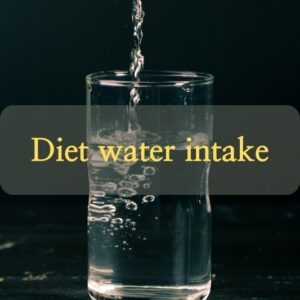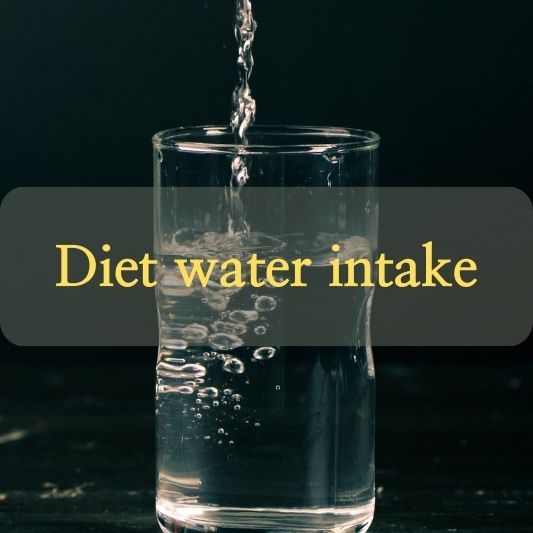In the pursuit of a healthier lifestyle, dieting often takes center stage. People embark on diets for various reasons – weight loss, improved overall health, or simply to feel better about themselves. Whatever your motive may be, one crucial element to consider during your dieting journey is your water intake. Hydration plays a pivotal role in supporting your body through the rigors of dieting. But how much water should you drink while dieting? Let’s delve into this essential question, exploring the factors that influence your hydration needs during a weight loss regimen.

Hydration and Weight Loss: The Connection
Understanding the Significance of Water
Water is the elixir of life, and it holds an undeniable significance when it comes to dieting. It is the most abundant substance in the human body, making up a substantial portion of our overall composition.
Water’s Role in Metabolism
Staying hydrated is closely linked to maintaining a healthy metabolism. When you’re well-hydrated, your body’s metabolic processes operate optimally, aiding in the burning of calories and fat.
Appetite Suppression
Drinking water before meals can help control your appetite. It can give you a sense of fullness, reducing the chances of overeating during mealtime.
Water Retention and Weight Fluctuations
Water retention can sometimes lead to misleading fluctuations on the scale, making it crucial to understand how to differentiate between retained water weight and actual fat loss.
Determining Your Water Intake Needs
Individual Variations
There is no one-size-fits-all answer to the question of how much water you should drink while dieting. Individual factors play a significant role, including age, gender, weight, and activity level.
General Guidelines
As a general guideline, aiming for about 8 to 10 cups (64-80 ounces) of water per day is a good starting point for most adults. However, this should be adjusted based on individual needs.
Dieting and Increased Water Needs
When you’re dieting, you may need more water than usual. This is because certain diet plans can increase the loss of fluids through mechanisms such as ketosis.
Signs of Proper Hydration
Paying Attention to Your Body
Your body provides cues to indicate whether you are adequately hydrated or not. Learn to listen to these signals to maintain the right balance.
Clear Urine
One of the simplest ways to gauge your hydration level is to check the color of your urine. Clear or pale yellow urine usually indicates proper hydration.
Thirst
While it may sound obvious, feeling thirsty is a clear sign that your body needs more water. Don’t ignore this natural indicator.
Balanced Electrolytes
Proper hydration also means maintaining a balance of electrolytes in your body. Too much water without electrolytes can lead to an imbalance.
Hydration Tips for Dieting Success
Create a Hydration Plan
Develop a daily hydration plan that factors in your activity level, diet, and individual needs. Keep a water bottle handy as a reminder to drink throughout the day.
Monitor Your Diet
Be mindful of foods with high water content, such as fruits and vegetables, which can contribute to your overall hydration.
Avoid Excessive Fluid Intake
While it’s essential to stay hydrated, excessive fluid intake can lead to hyponatremia, a condition where your blood sodium levels become dangerously low.
Conclusion
As you embark on your dieting journey, remember that staying hydrated is an integral part of the process. The amount of water you should drink while dieting varies from person to person, so it’s crucial to pay attention to your body’s signals and adjust your intake accordingly. Hydration not only supports your metabolism but also helps control your appetite and contributes to overall well-being.
Now, as you continue on your path to a healthier you, keep these hydration guidelines in mind. And if you have any more questions about dieting and hydration, check out these FAQs below.
FAQs
1. Can I replace water with other beverages while dieting?
While water should be your primary source of hydration, other unsweetened beverages like herbal tea or infused water can be included in your daily intake.
2. What should I do if I’m not a fan of plain water?
You can add a twist of flavor to your water with slices of fruits like lemon, lime, or cucumber to make it more appealing.
3. Does drinking more water speed up weight loss?
Adequate hydration can support your weight loss efforts, but it won’t replace the need for a balanced diet and exercise.
4. Can I overhydrate while dieting?
Yes, it’s possible to overhydrate, which can be harmful. Listen to your body’s signals and aim for a balanced intake.
5. Should I drink more water during specific types of diets, like keto or low-carb diets?
Yes, some diets may increase water loss, so adjust your intake accordingly, especially if you’re following a keto or low-carb plan.
Find out the price of diet supplements on iHub!
Find out the side effects of polycosanol!
